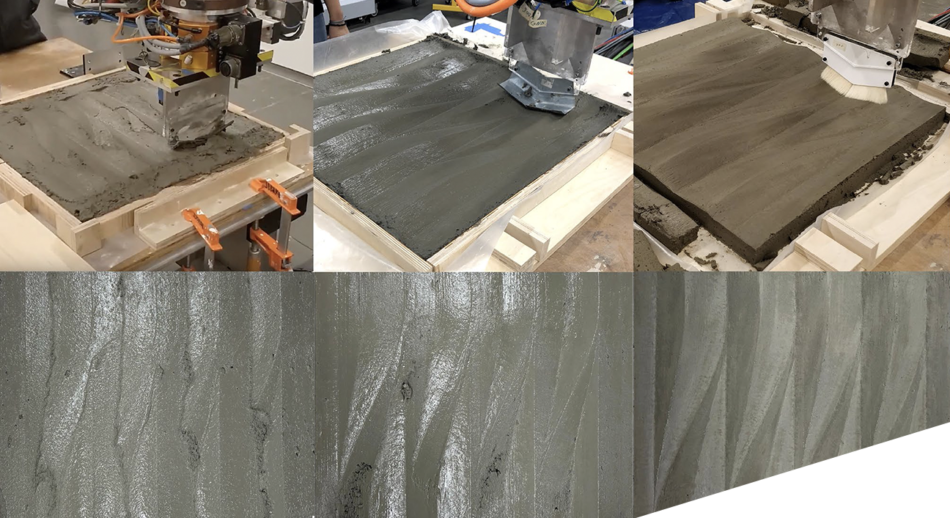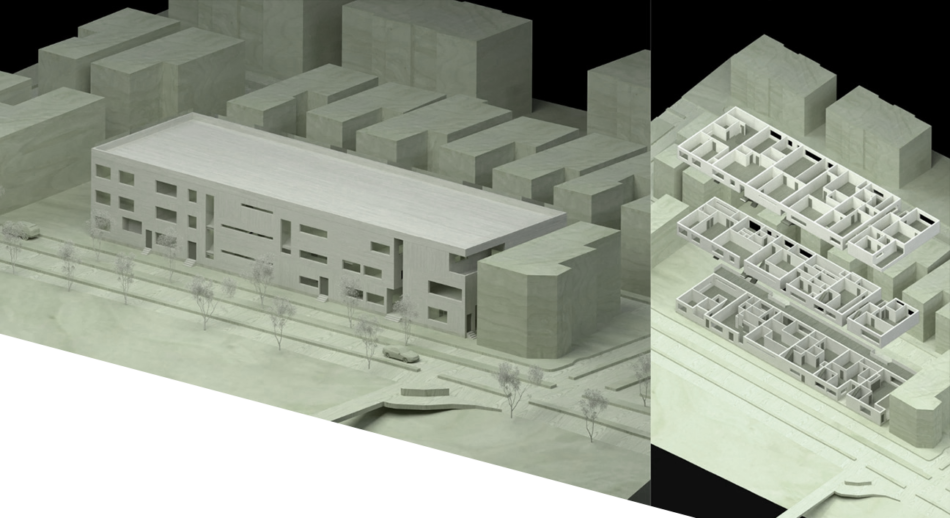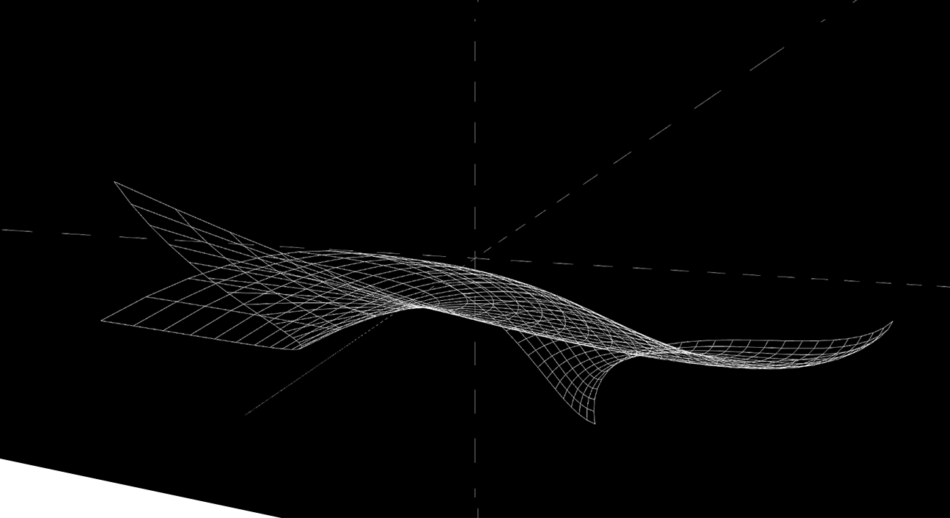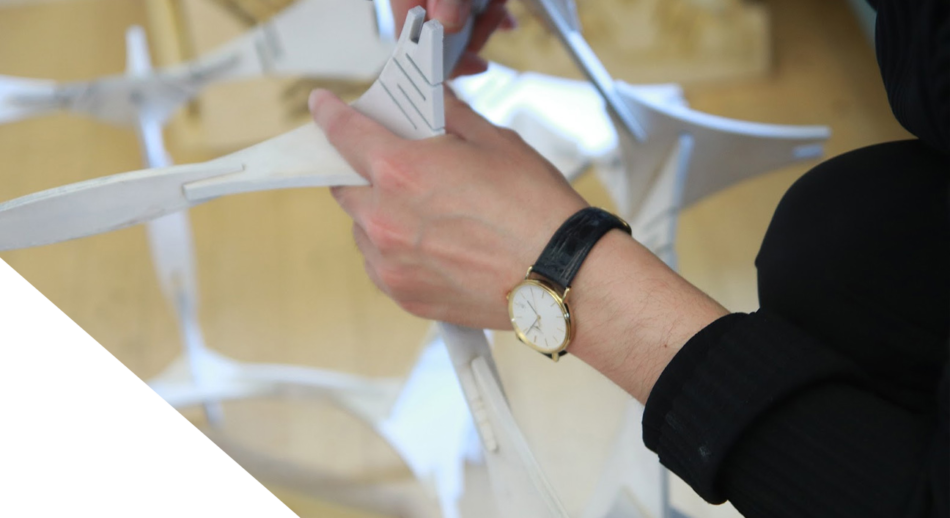Research
CodeLab Projects and Groups
Robotic Finishing of Hardset Materials

This research team develops novel approaches to the robotic shaping of hardset materials (any material that is workable before hardening to its final form e.g. concrete, plaster, bio-composites). We focus on manufacture of facade panels with complex surface geometries without the use of dedicated molds. This hybrid construction method combines material deposition with tooled post-processing to achieve high-resolution surface definition. The process entails automated delivery of material for selective deposition of panel geometry, and tooled shaping of rough and finish layers for the physical production of computationally generated forms. The goal of this research project is to accelerate the design and development of complex material building systems combining additive manufacturing with robotic post-processing for industry use.
Team
Faculty: Joshua Bard (PI), Dana Cupkova (PI), David Bourne (Co-PI), Newell Washburn (Co-PI),Students: Jingyang Liu (PhD CD), LÖzgüç Bertuğ Çapunaman (MSCD), Ardavan Bidgoli (PhD CD), Wei Wei Chi (MSCD), Sinan Goral (BArch), Yi-chin Lee (MSCD) Marantha Dawkins (MSSD), Daniel Cascaval (BA), Manuel Rodríguez Ladrón de Guevara (PhD CD), Seong Yeun Kim (BArch), Gyeong Yeon Kim (BArch)
Recent/Selected Publications
- Jingyang Liu, Yi-chin Lee, and Joshua Bard. “Material characterization of workability and process imaging for robotic concrete finishing.” Construction Robotics 5.1 (2021) pp.73-85. https://link.springer.com/article/10.1007/s41693-021-00058-9
Active
Present

Deep Time Architectural Data

This project investigates new paths for architectural and spatial documentation employing recent computational methodologies including photogrammetry, drone photography, computer vision/3-D reconstruction, digital twins, and deep learning. The project focuses on digitally documenting a selection of wooden folk churches dating back to the period between the 17th and 19th centuries in the central Carpathian region of Eastern Europe, and on analyzing them using deep learning techniques. The team documents spaces and buildings in the Pittsburgh area to gain familiarity with technical frameworks for spatial capture, examine the state of the art, and develop their own projects, experiments, or case studies on digital architectural capture methods.
Team
Faculty: Daniel Cardoso Llach (PI); Mykhailo Syrokhman (Co-PI, Uzhgorod College of Fine Arts, Ukraine); Special Collaborator: Michael Hasey (Samsung); Students: Felicia Luo (MSCD ‘24), Isaac Martinotti (MSCD ‘25), David Troetschel (MSCD ‘24), Jinmo Rhee (PhD-CD ‘24)
Recent/Selected Publications
- Hasey, Michael, Jinmo Rhee, and Daniel Cardoso-Llach. “Form Data as a Resource in Architectural Analysis: An Architectural Distant Reading of Wooden Churches from the Carpathian Mountain Regions of Eastern Europe.” Digital Creativity 0, no. 0 (April 30, 2023): 1–24. https://doi.org/10.1080/14626268.2023.2201281.
Active
2022-Present

Rethinking Automation in Construction (ReAC)

ReAC researches and works to develop “robot in the loop” adaptive systems that enhance and interact with human expertise on site, fostering a vision for human-machine construction that does not aspire to automate, replace, or surveil construction workers. To accomplish this the group approaches the technology design process reflectively through a combination of qualitative engagements with construction actors and sites, simulations, as well as technical research into robotics and reinforcement learning. Striving for dynamic and safe robotically-supported construction environments, this project fosters humane and sustainable technological practices in the architecture, engineering, and construction (AEC) industry, as well as new forms of expertise at the intersection of AI, robotics, the building trades, and architecture.
Team
Faculty: Daniel Cardoso Llach (PI) and Jean Oh (Co-PI); Yuning Wu (PhD CD), Emek Erdolu (PhD CD), Ardavan Bidgoli (PhD CD), Zhihao Fang (MSCD ’20), Ammar Hasonjee (B.Arch ‘21), Bradley Williams (MSCD ’23), Willa Yang (MSCD ’22)
Recent/Selected Publications
- Fang, Zhihao, Yuning Wu, Ammar Hassonjee, Ardavan Bidgoli, and Daniel Cardoso Llach. “Towards a Distributed, Robotically Assisted Construction Framework.” In Distributed Proximities. Online + Global, 2020.
- Fang, Zhihao. “Towards Multi-Drone Autonomous Construction via Deep Reinforcement Learning.” Thesis, Carnegie Mellon University, 2021. https://doi.org/10.1184/R1/14138024.v1.
URL
Active
2019-Present

Creative AI and Design Launchpad (CRAIDL)

CRAIDL is an Artificial Intelligence (AI) research initiative led by doctoral students at Carnegie Mellon University’s Computational Design Laboratory. Housed in the School of Architecture, it focuses on the intersection of AI and art, design, engineering, and architecture in domains including Natural Language Processing, Reinforcement, Learning, Deep Learning, and Machine Learning. CRAIDL is a natural result of recent inquiries, projects, research, and publications developed at the lab and in collaboration with other schools and departments at CMU including the School of Computer Science and the Language Technologies Institute.
Team
Manuel Rodríguez Ladrón de Guevara (PhD CD ’23), Ardavan Bidgoli (PhD CD ’22), Jinmo Rhee (PhD CD ’23), Pedro Veloso (PhD CD ’22) with Faculty advisors: Daragh Byrne, Daniel Cardoso Llach, and Ramesh Krishnamurti.
Recent/Selected Publications
- Veloso, Pedro, and Ramesh Krishnamurti. (2021). “Self-Learning Agents for Spatial Synthesis.” In Proceedings of the 5th International Symposium on Formal Methods in Architecture (5FMA), edited by Sara Eloy, David L. Viana, Franklim Morais, and Jorge V. Vaz. Springer.
- Ladron de Guevara, M., George, C., Gupta, A., Byrne, D., & Krishnamurti, R. (2020). “Multimodal Word Sense Disambiguation in Creative Practice”. In IEEE International Conference on Machine Learning and Applications (ICMLA). https://arxiv.org/abs/2007.07758
- Bidgoli, A., Ladron De Guevara, M., Hsiung C., Oh J., and Kang E. (2020). “Artistic Style in Robotic Painting; a Machine Learning Approach to Learning Brushstroke from Human Artists.” In Proceedings of the 29th International Conference on Robot and Human Interactive Communication (RO-MAN). Naples.
URL
Active
2019-Present

Experimental Archaeologies of CAD (xCAD)

Computer-aided design systems are cultural artifacts which have re-structured the intellectual labors, and lived experiences, of architects, engineers, and other designers over the last fifty years. This line of work is organized around new interrogative research methods (software reconstruction, emulation, and speculation) to illuminate visual, sensual, and tactile aspects of these systems — and to re-imagine their future.
Team
Faculty: Daniel Cardoso Llach; Students: Emek Erdolu (PhD CD), Jinmo Rhee (PhD CD), Scott Donaldson (MSCD ’19), Harshavardan Kedia (B.Arch ’19), Erik Ulberg (MSCD ’20).
Recent/Selected Publications
- Cardoso Llach, Daniel, Eric Kaltman, Emek Erdolu, and Zachary Furste. “An Archive of Interfaces: Exploring the Potential Of Emulation for Software Research, Pedagogy, and Design.” Proceedings of the ACM Conference in Computer Supported Collaborative Work, Virtual, 2021.
- Cardoso Llach, Daniel, and Scott Donaldson. “An Experimental Archaeology of CAD: Using Software Reconstruction to Explore the Past and Future of Computer-Aided Design Technologies.” In Computer-Aided Architectural Design. “Hello, Culture,” edited by Ji-Hyun Lee, 105–19. Communications in Computer and Information Science. Springer Singapore, 2019.
- Daniel Cardoso Llach. 2018. “Reconstructing ‘Sketchpad’ and the ‘Coons Patch’: Toward an Archaeology of CAD.” Leonardo 51 (4): 429–30. https://doi.org/10.1145/3202918.3205925
URL
Active
2017-Present

Generative Fabrication (genFab)

This research combines research into geometry, mechanical assemblies, and computation in order to develop a computational framework for designing, fabricating, and assembling complex spatial structures. An aim of the project is to produce open ended tectonic design-to-fabrication languages enabling rapid fabrication and assembly at the architectural scale. We achieve this by combining the additive and combinatorial logic of “generative” design systems at the global (assembly) scale, with materially informed parametric flexibility at the local (component) scale.
Team
Faculty: Daniel Cardoso Llach; Students: Jingyang Liu (PhD CD), Yi-Chin Lee (MSCD ’20), Weixin Qiu (MSCD ’20).
Recent/Selected Publications
- Liu, Jingyang, Yi-Chin Lee, and Daniel Cardoso Llach. “Computational Design and Fabrication of Highly Customizable Architectural Space Frames: Making a Flat-Cut Weaire-Phelan Structure.” International Journal of Architectural Computing, August 21, 2020, 1478077120949033. https://doi.org/10.1177/1478077120949033.
- Cardoso Llach, Daniel, Jingyang (Leo) Liu, and Yi-Chin Lee. “Algotecton.” In ACM SIGGRAPH 2020 Art Gallery, 455–56. SIGGRAPH 2020. New York, NY, USA: Association for Computing Machinery, 2020. https://doi.org/10.1145/3386567.3388563.
URL
https://dl.acm.org/doi/10.1145/3386567.3388563
Active
2017-2020